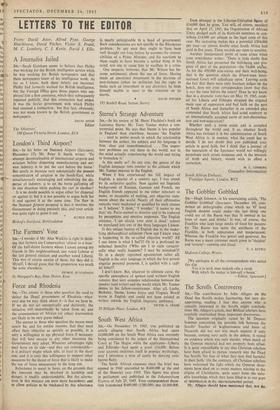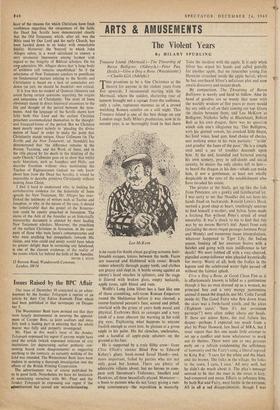The Scrolls Controversy
Sla,—The contribution by John Allegro on the Dead Sea Scrolls makes fascinating, but very dis- appointing, reading. I fear that anyone who is casually interested in the Scrolls might conclude, from Mr. Allegro's article, that Biblical scholars have carefully overlooked these important discoveries.
The question originally raised by M. Dupont Sommer concerning the possible link between the Scrolls' Teacher of 1.ighteousness and Jesus of Nazareth did not not win much support if only because, coming very early in the debate, it rested on evidence which was very slender, when much of the Qumran material had not properly been sifted. It is quite unjustifiable to say that Christian scholars have been afraid to pursue research into the Dead Sea Scrolls 'for fear of what they may find harmful to their faith.' On the contrary, all Christian scholars have welcomed the light which the Qumran docu- ments have shed on so many matters relating to the origins of Christianity, quite apart from the valu- able knowledge which they have filled-in to our gaps of information in the intertestamental period.
Mr. Allegro should have mentioned that, not the
least of the reasons for which Christians have fresh confidence regarding the uniqueness of the faith, the Dead Sea Scrolls have demonstrated clearly that the Old Testament, which, after all, was the Bible used by Our Lord and the early Church, has been handed down to us today with remarkable fidelity. Moreover, the 'boycott' to which John Allegro refers, is a word calculated to convey a very erroneous impression among laymen with regard to the integrity of Biblical scholars. On his ov-admission, Mr. Allegro shows that 'a large body of evidence still remains unpublished.' So if the reluctance of New Testament scholars to pontificate on fundamental matters relating to the Scrolls and Christianity is based on a lack of cumulative evi- dence (as yet), we should be thankful—not critical.
It is true that no student of Qumran literature can avoid facing certain questions regarding the origins and uniqueness of Christianity. The story of Jesus obviously stands in direct historical succession to the life and thought of the period between the testa- Meats. And the language of the Scrolls showt how fully both Our Lord and the earliest Christian preachers accommodated themselvei to the thought- and liturgical-forms of the period. But no Christian need merely resort naively to 'pleading the divine nature of Jesus' in order to make the point that Christianity stands unique. Oscar Cullmann (in The Scrolls and the New Testament, ed. Stendahl) has demonstrated that 'the difference remains in the Person, Teaching, and the Work of Jesus, and in the role played by his death in the thinking of the early Church.' Cullmann goes on to show that whilst early historians, such as Josephus and Philo, can describe Essenism without once mentioning the Teacher of Righteousness (indeed, we only know about him from the Dead Sea Scrolls), it would be impossible to describe primitive Christianity without naming Jesus Christ.
I find it hard to understand why, in looking for corroborative evidence for the historicity of Jesus ptside the New Testament, Mr. Allegro has over- looked the testimony of writers such as Tacitus and Josephus, or why, in the nature of the case, it should be 'unbelievable' that the gospel of the Resurrec- tion could be openly preached In Jerusalem. The status of the Acts of the Apostles as an historically trustworthy document is attested by most leading New Testament scholars. Moreover, the preaching of the earliest Christians in Jerusalem, in the com- pany of those who were Jesus's contemporaries and who were anything but sympathetic towards His claims, and who could and surely would have taken no greater delight than in correcting any falsehood, is one of the clearest evidences of the reality of the events which lay behind the faith of the Apostles.
DAVID J. ELLIS
12 Burcote Road, Wandsworth Common, London, SW18































 Previous page
Previous page